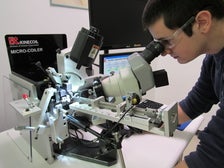Worcester manufacturing pay up 28% in 10 years
 Courtesy Phillips Precision
Salaries for the region's manufacturing workers have increased 28 percent since 2006, according to the U.S. Bureau of Labor Statistics.
Courtesy Phillips Precision
Salaries for the region's manufacturing workers have increased 28 percent since 2006, according to the U.S. Bureau of Labor Statistics.
The average annual pay for an employee of a Worcester County private manufacturing company dipped slightly last year to $74,642, but salaries for the region’s manufacturing workers have increased 28 percent since 2006, according to the U.S. Bureau of Labor Statistics.
“To find more bodies, we are fighting the companies doing the same thing, and we keep driving the price up on each other,” said Bob Miller, general manager at the Franklin facility for medical device maker Tegra Medical.
Because of the low unemployment rate at 3.6 percent in September, an even smaller labor pool of technically trained workers, the increasing complexity of manufacturing equipment, and a rising minimum wage for even the lowest-level production worker, the industry has been an employees’ market for the last 10 years. At $86,072, the average Massachusetts private manufacturing employee makes 22 percent more than the statewide salary average for all industries of $70,628, according to the U.S. Census Bureau.
“Worcester County has one of the highest concentrations – if not the highest concentration – of manufacturing companies in the state, and that is driving competition for workers and pay scale,” said Brian Gilmore, executive vice president at the Associated Industries of Massachusetts.
Fewer workers, more work
At Tegra Medical, Miller has hired 40 new employees this year and would hire another 20 tomorrow if he could find enough people qualified to do the work. His facility employs 350 of Tegra’s 710 global workers.
Miller has lowered his standards from people already trained with the equipment skills necessary to operate Tegra’s production to people with any relevant experience who can be trained to do the work.
A new worker with equipment training at Tegra will make $15-$16 immediately. Someone with no training can receive $13-$14 per hour. Either way, after their initial probationary period, workers receive a 5-10 percent raise, he said.
“It is the technology driving the salaries,” Miller said.
In order to be competitive globally despite high salaries, Tegra has to be as efficient as possible in its production, which often means investing in state-of-the-art equipment that can deliver goods to clients quickly and cheaply, he said.
All this investment in new equipment means Tegra needs skilled workers to operate it. Because people with those skills are few, the salaries they demand are high. The highest-end operators in the company make more than $100,000 a year, Miller said.
Tegra has put in 10 new pieces of robotic production equipment in the last year, which replaced the need for 30 employees, but the amount of work grew so much that those employees were simply reassigned to other areas of the business, Miller said.
“We are emphatic that no one in our company will ever lose their job to a robot, but in order to stay competitive, we have to be on the cutting edge of technology,” Miller said.
The silver tsunami
On top of the already high demand for skilled workers is the looming problem that most of them are older and 10,000 statewide are expected to retire within 10 years, said Gilmore.
Manufacturers will have to continue to pursue sophisticated pieces of equipment to stay competitive, so the demand for these highly skilled workers will only grow, Gilmore said.
“That will drive the pay scale further up,” he said. “It is a good story, and hopefully it will drive more people to consider a manufacturing career.”
Most careers in manufacturing don’t require a bachelor’s degree, Gilmore said, as more companies are looking for people with specific training and/or certificates for certain types of work.
“You can find a good job right out of high school,” Gilmore said.
Minimum increases
Even companies relying heavily on basic entry-level production workers will see an increase in labor costs in January when the minimum wage rises to $11 per hour, said Steven LeBlanc, director of human resources at Worcester vehicle enclosure manufacturer Curtis Industries.
Curtis increased its minimum hourly pay for production workers to $11 an hour this year – up from $10.50 in 2015 – to stay ahead of the competition.
It also enables the company to adjust its cost models to account for the increase in pay, said LeBlanc.
As the Massachusetts legislature and ballot questions keep bringing up the issue of further minimum wage increases moving forward into the somewhat near future, Curtis wants to keep staying ahead of the curve, he said.
“We want to position ourselves to be prepared for when it goes up again,” LeBlanc said.












0 Comments